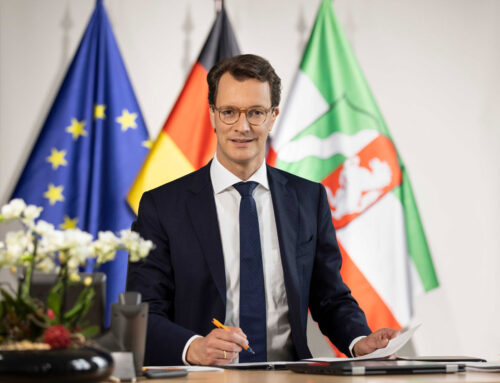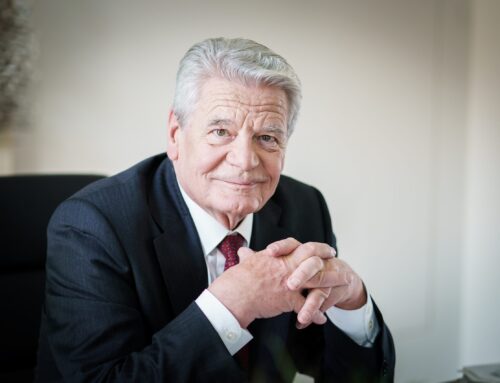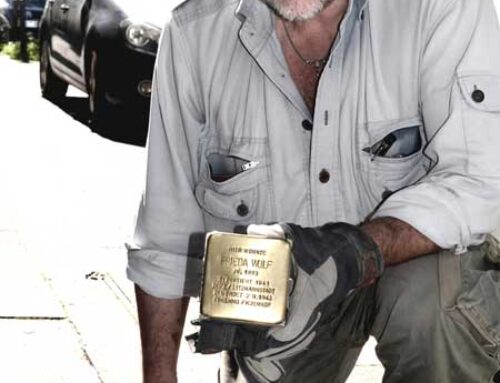Former Federal President Joachim Gauck was honored with the Benedict Prize of Mönchengladbach, one of the most important awards in North Rhine-Westphalia, on 5 December 2024 in front of around 300 invited guests at Haus Erholung in Mönchengladbach.
In his laudatory speech, Minister President Hendrik Wüst particularly emphasized Gauck’s commitment to a defensive democracy, freedom and Christian values. He emphasized that Gauck always had a clear stance and was not afraid to speak uncomfortable truths. As early as 2014, before Russia’s annexation of Crimea, he had called for Germany not to hide from its history and to show greater commitment to national security and democracy. During the refugee crisis in 2015, he warned of the limits of resilience and called for a balanced but resolute stance in terms of striking a balance between the demands of migration and human rights. Gauck was described by the laudator as a human rights defender and an encourager who never chooses the path of simple consensus, but instead advocates the long-term preservation of values.
Gauck’s biography is strongly influenced by his experiences with a totalitarian system. Growing up in the GDR, he experienced the pressure of a socialist regime and became involved in the church opposition as a Protestant pastor. After the fall of the Wall, he played a leading role in the civil rights movement “Neues Forum” and campaigned for the democratization of the former GDR. As chairman of the special committee to dissolve the Ministry for State Security, he played a key role in ensuring that democratic values also became a reality in this part of Germany. His ten-year tenure as Federal Commissioner for the Stasi Records reinforced his consistent pro-freedom stance.
Even after his time as Federal President (2012-2017), Gauck remained committed to liberal democracy. In public statements and in his books, he regularly warns of impending dangers, currently in particular from cross-border authoritarian tendencies in Russia and other countries. Gauck’s Christian values form the basis of his political convictions. He sees himself as a mediator who wants to maintain confidence in the strength of democracy in an increasingly polarized world.
Lord Mayor Felix Heinrichs praised Gauck as a personality who has taken on and continues to take on responsibility for the state and society with a clear stance and a high level of commitment, and who is exemplary in his admonition to defend democracy. His ideas, emphasized Heinrichs, are lived in Mönchengladbach time and again.
In his speech, Ulrich M. Harnacke, Chairman of the Mönchengladbach Benedict Prize Association, recalled the namesake of the prize, St. Benedict of Nursia, who stands for the unity of faith and reason and sees himself as a bridge builder between cultures, ideas and people. These values are just as relevant today as they were in his time. According to Harnacke, Gauck shares these values. He repeatedly made people aware of the great value of freedom in responsibility and called for trust in the strength of our democracy and in the future viability of our country.
Joachim Gauck underlined this attitude in his words of thanks. In a remarkable speech, he focused on the threat to freedom and democracy posed by Russia under Vladimir Putin and its war of aggression in Ukraine, which he described as currently the greatest and most immediate threat to Europe’s security.
The honoree, who has campaigned for freedom, democracy and the rule of law throughout his life, emphasized the importance of a stable, liberal-democratic, defensive society in view of the dramatic threat to these values posed by the Russian war of aggression. He appealed to Western democracies to stand up for these values and emphasized the importance of courage and credible deterrence, including military determination.
Gauck announced that he would donate the prize money of 5,000 euros to support Ukraine, which in his opinion urgently needs the support of the Western world.
His remarks were met with standing applause.
The ceremony was accompanied by music from the Vitus Quartet of the Lower Rhine Symphony Orchestra and ended with a reception in the recreation rooms.
Speech manuscript by Joachim Gauck: https://www.joachim-gauck.de/deutschland-europa/2024/benediktpreis-verleihung/





